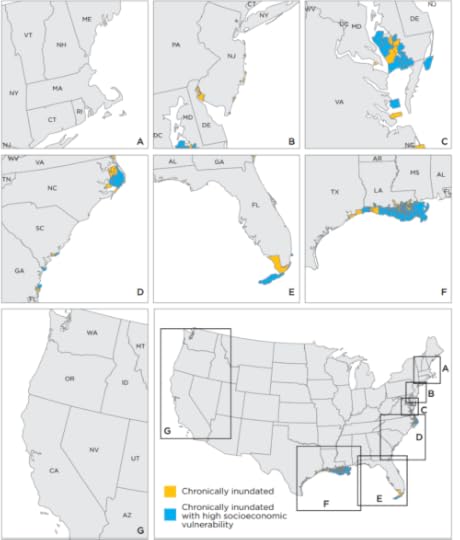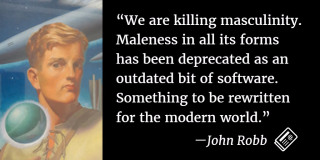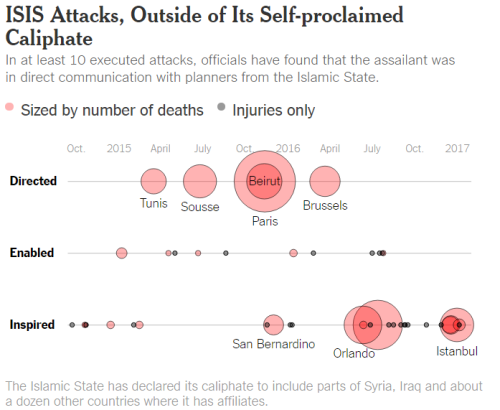John Robb's Blog, page 4
July 13, 2017
How to turn the AI Economy into wealth, income, and pensions for millions
Six years ago, I floated a business plan for building a new type of company (an open source venture). An open source venture is structured in a way that makes it possible for millions of worker/owners to collaborate on the construction of extremely valuable databases. That initial attempt wasn’t successful, with good reason: it was too early. The databases that could be built weren’t as valuable as they needed to be to support millions of contributors and the system needed to manage decentralized ownership (the blockchain) was still in its infancy.
Things have changed. The rapid rise of AI (more specifically, deep learning/ConvNet), has turned massive, human labelled/curated, databases into some of the most valuable information on earth. Second, the blockchain is now mature enough to support the infrastructure needed to make it possible.
Here’s some more detail. Building AIs requires three things:
Scalable models of AI construction with high capacity (we have that now deep learning/ConvNet now).
Lots of processing power (to train AIs). Moore’s law cracked the initial barrier to using these methods. Cloud based training systems filled with GPUs is making this less expensive.
Big data sets (specifically, human curated data) are used by the AI’s to learn.
You should already see the how well suited open source ventures filled with millions of worker owners fits into this process. For example:
A recent study by Google showed that the size of the training database correlated to the quality of the AI. The bigger the better. That’s a bit of a problem for the big tech companies. Currently, most of the of the databases currently available were built by very low cost workers for a fraction of a penny a label, using places like Amazon’s Mechanical Turk. That makes them clunky to build and difficult to scale. Further, the labelled, human curated data they do have (on Facebook, Google, etc.), while voluminous, isn’t complete enough to do high quality training. An open source venture fills the void. It could enlist millions of worker/owners to build, maintain and extend the data needed would be very successful here, creating some of the most valuable AIs in the world.
The processing power needed to train these AIs, as they become more sophisticated, could outstrip current corporate capabilities (of even Google). This suggests that training systems that break apart the computation tasks among tens of millions of participants (cell phone/desktop) could surmount this barrier. In practice, it would be a combination of folding@home and bitcoin mining. Already, deep learning AIs can “run” on cellphones. Configuring them to contribute to the training load and/or actively gather data for database construction isn’t that much of a stretch.
The people participating (earning equity instead of fee for service for their contributions) could become very, very large. They would be familiar with the platform and become increasingly sophisticated at finding amazing ways to capture new data and new AIs to build. They would also be a built in audience of early adopters for new AIs, pushing them across the chasm into the mainstream and radically improving their operation due to the sophistication of their interaction with them. Over time, a platform like this could become the source of many (if not most) of the best AIs ever built. A source of immense wealth (seen as dividends) for hundreds of millions of owners, earning equity with each contribution.
Worth thinking about.
John Robb
PS: Given our experience with bitcoin, this isn’t impossible to do. It’s also a much better future than a world that one based on Turking day laborers.
JOURNAL: Some actionable information on rising sea levels
It's a pretty good bet we're going to see a rise in sea levels (we already have). Here's a good report by the Union of Concerned Scientists with some much needed detail on how it will impact us.
How it will do damage: Rising sea levels will have its greatest impact in terms of chronic tidal flooding. Basically, every couple of years, the first floor of your house is filled with seawater destroying everything.
Where will chronic flooding occur? Three maps. The first one is an intermediate scenario for 2035 (less than 20 years out) and second is one for 2060.

Expected by 2035
Note that the impact by 2035 is mostly in four areas (DE, FL, LA, and NC). By 2060, that damage deepens and expands considerably. It turns almost all of the eastern (including NYC and Boston) and southern coasts into chronic tidal flood zones.

Expected by 2060
Here's the last. 2100. Note that even by 2100 chronic tidal flooding is largely a eastern/southern coast problem. The West coast does relatively well.

Expected by 2100
Hope this actionable information helps you make better decisions (or at a minimum, let's you effectively process the news this situation will produce).
John Robb
June 14, 2017
Idea: The Automation of Terrorism
I figured out what I'm going to talk about at the Prime Minister's conference in Singapore next month: the automation of terrorism. Here's the outline of what I'm going to discuss (I already have most of the thinking on this topic already done and the trend is already in motion).
____________
New technologies have put us on the brink of a significant upgrade to extremist violence. Specifically, it may now be possible to fully automate a terrorist attack or worse, a terrorist network. Here’s how:
Social networking already connects billions of people worldwide and it is rewiring us psychosocially. We can already see the disruptive effects of this, creating an environment conducive to extremism:
It made it possible to topple governments across the Middle East.
It enabled ISIS to recruit 30,000 people from across the world.
It made the very rapid shift to self-activated terrorism (over the last year) possible.
Bots (software) build make it possible to automate extremist activities on and across social networks (as seen in the recent US election).
Bots have demonstrated the spread and amplification of extremist disinfo.
Bots can shape public discourse online.
AI fueled bots will make it possible to completely automate the recruitment, grooming and activation of extremists.
Drones (hardware bots) make it possible to automate physical attacks. With relatively simple DIY modifications, drones can already:
Carry a payload large enough to cause significant damage.
Fly and navigate to a target w/o human support.
Visually identify targets and take action autonomously.
Sincerely,
John Robb
Written on a cool summer morning near "the shot heard around the world"
PS: Automation of this type has the potential to leverage (on a grand scale) the breakdown of masculinity in the West to disruptive effect.
June 5, 2017
The Common Driver of Public Violence
Mass killings in London, Portland, and Orlando over the last seven days (occurring at an increasing rate). We have categories for each type of attack:
London: Homegrown Jihadi terrorist attack.
Portland: Hate crime murders.
Orlando: Lethal postal rage in the workplace.
If we examine each category by itself, it's hard to determine any underlying factors common to the attack of that type. Jihadi terrorism has lots of contributing factors.
However, if we pop up a level and look at all of the attacks together a pattern emerges.
All of them are a product of failed men. Men who have failed in the world. Men tied up with crime, drugs, low paying jobs, unemployment, failed marriages, etc.
Men who do not have the psychological strength to bounce back from adversity. Men who are in deep psychological pain.
These failed men are:
Searching for redemption (a chance to become a holy warrior and become a man).
Trying to boost their status by attacking people they view as inferior.
Raging at God and the world by killing people the people they know (wife, kids, employers).
This psychological distress is real and it's getting worse (add to this the 50,000 people killing themselves every year through overdoses).
What's causing so much fail in the west? The death of positive masculinity and everything attached to it.
Signs of Deep Psychological Distress in America
Here's an indicator that Americans are suffering from deep psychological distress.
Americans are killing themselves in record numbers.
The method of choice? Overdose.
 This year, there will be over 50,000 deaths due to overdoses in the US and it's still climbing.
This year, there will be over 50,000 deaths due to overdoses in the US and it's still climbing.
That's already the lethal equivalent to the US of a Vietnam war every year or WW2 every eight years.
It's already twice as lethal to Americans as accidental deaths from automobiles.
The majority of the deaths are of people 35-54 and it impacts both men and women. It also leaves millions of friends and family members with PTSD in its wake.
This level of self-harm isn't simply due to the wide availability of prescription drugs (particularly since the rate falls precipitously with older Americans).
The reason runs deeper. It suggests deep psychological pain. A gnawing pain that is being manifested in our politics and in the increasing amount of public violence we are seeing.
A pain due to society that has deprecated all of the deep psychological building blocks that make us viable social connected human beings. They were thrown away as if they were simply constructs of our imagination rather than evolved system that have proven their worth to our collective survival over millions of years.
The last time this occurred we ended up in a 70 year struggle than nearly put global civilization on a millenia hiatus. This time? I'm not so sure.
John Robb
June 2017 - A rainy New England
PS: All of this is made worse in the US/Anglo economic system. Why? It's become increasingly ruthless, rigged, and distorted. That has put even more pressure on individuals to become resiliently bounce back from adversity. Unfortunately, mental resilience is predicated on a mind built on solid ground, not sand like it is today.
PPS: How do we get through this intact? My gut suggests the only social structure that will allow us to progress beyond this impasse is one that enables increased psychological diversity while at the same time aggressively preserving traditional paths of meaning. We should avoid at all costs seeing this as a struggle between oppressive identities or as a corruption of tradition that should be ruthlessly eradicated. A more complex middle ground that allows both to flourish is only way to avoid history's abattoir.
June 2, 2017
"Man is dead, and we have killed him, you and I!"
In Die fröhliche Wissenschaft, Nietzsche proclaimed "God is dead, and we have killed him, you and  I!"
I!"
Even back in the late 1800's, Nietzsche had the genius to see that science was in the process of killing God and with it Christian morality.
What was the result? Deep psychological trauma and a vacuum of meaning. That vacuum was filled by tribal nihilism (fascism) and economic utopianism (communism). Movements that almost turned the 20th Century into our last as a species.
Unfortunately, it appears that western society is in the process of killing something of equal import in this century. Something that has been a foundational building block of the psychology of our species for millions of years. Something that IS causing a vacuum of meaning and deep psychological trauma.
We are killing masculinity. Maleness in all its forms has been deprecated as an outdated bit of software. Something to be rewritten for the modern world.
However, it's not something that is easily rewritten. It's part of us, both individually and as a group, at a deep structural level. A foundational building block that has proved advantageous to our survival over millions of years of human social evolution.
It's in the kernel of our social being. This makes trying to rewrite it on the fly akin to rewriting the software on a modern jet aircraft travelling at mach 3. It's not only impossibly difficult, it's existentially dangerous for everyone onboard (all of us).
Regardless, we're rewriting it and we can already see its ill effects. We can see it in the deep psychological distress it is causing in men and women. We can see a vacuum of meaning forming all around us. A void that new social movements are starting to fill from the online tribal nihilism that propelled Trump into the oval office to identity utopians who are being manufactured by the millions in US Universities.
As it stands right now, we're likely screwed. If the last Century is any guide, it's going to require oceans of blood to resolve this loss...
John Robb
June 2017
April 11, 2017
How Algorithms and Authoritarianism Created a Corporate Nightmare at United
"I was only following corporate algorithms"
Testimony given at a future war crimes trial (riff on the Nuremberg defense)
United Airlines forcibly removed a man from an "overbooked" flight. The incident was captured on video by other passengers and the story went viral on the social networks. United flubbed its response to incident, adding fuel to the anger. The story went global overnight, sparking massive outrage (hundreds of millions of views in China, an important market for United). The next day, United stock gets hammered, losing ~$1.4 billion off its stock price by midday. What happened? This incident is a pretty good example of how rigid algorithmic and authoritarian decision making can create corporate disasters in an age dominated by social networking.
Algorithms
Here's how the algorithmic decision making created the incident on United.
United employees board a full flight from Chicago to Louisville. A United flight crew headed to Louisville arrives at the gate at the last moment. A corporate scheduling algorithm decides that the deadheading flight crew has priority over passenger fares and that it needs to remove four passengers to make room for them (the flight wasn't overbooked).
United asks for volunteers. A corporate financial algorithm authorizes gate employees to offer passengers up to $800 to take a later flight (offering a bigger incentive wasn't an option). No passenger takes them up on that offer.
United now shifts to removing passengers from the flight non-voluntarily. To determine who gets removed from the aircraft, United runs a customer value algorithm. This algorithm calculates the value of each passenger based on frequent flyer status, the price of the ticket, connecting flights, etc. The customers with the lowest value to United are flagged for removal from the flight (it wasn't a random selection).
Authoritarianism
Here's how authoritarian decision making (common on modern air travel) made things worse. Note how this type of decision making escalates the problem rapidly.
The United flight crew approaches the four passengers identified by the corporate algorithm and tells them to deplane. Three of the people designated get off the flight as ordered. One refuses. Since disobeyal of instructions from the flight crew is not tolerated in post 9/11 air travel, the incident is escalated to the next level.
United employees call the airport police to remove the passenger. The airport police arrived to remove the unruly (he disobeyed orders) passenger. The passenger disobeys the order from the airport police to deplane. Disobeyal of an order by a police officer rapidly escalates to violence. The police then remove the passenger by force (the video of this is shared on social media).
The CEO of United Airlines rapidly responds: "While I deeply regret this situation arose, I also emphatically stand behind all of you, and I want to commend you for continuing to go above and beyond..." In short, the CEO praises his employees for following the corporate algorithms and for not backing down when their authority to remove a passenger was questioned (which resulted in more negative backlash on social networks)>
What this means for Organizations
As you can see, United was designed to fail in a world connected by social networking and they are not alone. Let's recap. United employees blindly followed the decision making of algorithms up to the point of telling seated passengers to deplane. The authoritarian decision making that followed was just as rigid and unyielding. Disobeying orders of the flight crew led to the police. Disobeying the police led to forced removal. Finally, the public failure of this process led United's CEO to praise employees for their rigid adherence to algorithmic and authoritarian decision making. The entire process was inevitable. It's also not a unique situation. We're going to see much more of this in the future as algorithms and authoritarianism grow in America. Here's how organizations are likely to respond:
Human decision making escape valves. Smart organizations will build escape valves into the algorithms used to dictate employee behavior. In other words, if an algorithmic process is going terribly wrong, it should be OK for an employee to find a non-standard way to solve it or ask for help. One way to jumpstart the process is to build a 24x7 "rapid response team" that can swoop in electronically (smart phone) to coach onsite employees on ways to response (and authorizing extremely non-standard responses on the spot).
Avoid authoritarian escalation at all costs. Once initiated, authoritarian decision making (comply!) can result in violent escalation. That's bad news in a socially networked world as we have seen, again and again. How will this play out? Bad organizations will increasingly try to find ways to blame the victim. For example, by saying the plane can't take off until this bad/sad man leaves OR deplaning all of the passengers in order to remove a non-compliant passenger by force in private. Smarter organizations will respond by finding ways to completely decouple business decisions from authoritarian escalation. For example: by radically increasing the voluntary behavioral incentives as needed or by asking for other passengers to help out the passenger in trouble (as in: this man is a doctor and needs to get back to see patients, can anyone help us keep him on the flight?).
Admit it and fix it. If a corporate algorithm yields a terrible result, smart organizations admit the failure. They admit it didn't work to both your customers and employees. Algorithms don't have feelings. They won't cry if you talk trash about them. Also, smart organizations don't punish employees for raising the flag on a broken algorithm. One last thought. Smart organizations know what their algorithms are (or that they even exist) and how to fix them. Dumb organizations see the process as inviable. It should be easy to spot the difference between these organizations by the number of disasters seen online,
John Robb
Writing on a gloriously sunny day in New England
April 10, 2017
Using Drones to Rapidly Set up Networks
Here's a new drone (warning, acronym creep) called the CICADA, or Close-In Covert Autonomous Disposable Aircraft.
It's tiny and weighs only 65 grams. It is meant to be dropped by an aircraft in a swarm (dozens at a time). Once released, each drone flies/glides to its target location and takes up residence.
What are they good for? Not much right now, but they could evolve into a way to rapidly deploy large, geographically dispersed networks of sensors and/or mesh communication nodes.
Why use them? They have the potential to provide P2P communications and real time intel to human units and autonomous weapons operating in a contested environment. In other words, a relatively simple mesh comms/sensor network like this would allow units in the field to connect with each other and sources of intel sideways.
Longer term? We will likely see vast networks of drone sensor/comms nodes that provide resilient over the horizon services that surpass (both in survivability and usability) those provided by satellites and other traditional means.
The Case for Neo Isolationism
It appears that neo-conservatives are now in control of the Trump White House.
The bombing of the Assad regime in Syria announced to the world the US was still in the business of micromanaging global political outcomes through the selective use of violence (a profoundly anti-conservative notion).
That's bad news. The US record on military adventurism and regime change over the last few decades has been stunningly bad.
Worse, it's a gross misallocation of resources comparable to disasters of Soviet decision making in the 80's. How bad is it?
The 59 Tomahawks the US fired at Syria (to pound sand at an abandoned air base) will cost ~$75 million to replace.
The cost of fixing the water system in Flint Michigan (yes, it still hasn't been fixed) is pegged at ~$55 million.
Looked at another way...
The US spent ~ $2 trillion ($6 trillion including interest) for an optional and unnecessary war in Iraq. $2 trillion is enough to:
build a permanent colony on Mars or
rebuild the entire US air and rail system from scratch or
provide catastrophic health insurance for every American citizen for four years... paving the way for real healthcare reform.
This gross misallocation of resources suggests that true American greatness is the real casualty of American military adventurism.
A casualty of a toxic foreign policy establishment that only defines greatness in terms of micromanaging the world through the selective use of violence.
Neo-Isolationism
How do we fix this failure? One answer is neo-isolationism. The premise of neo-isolationism is that America's best role in the world isn't as a superpower. Our best role is as an example. A continuous demonstration to the world of what is possible.
This means that our greatness isn't found in micromanaging the ageless hatreds and enmities of the past, found in abundance in the Middle East, it's found in creating the future here at home and sharing that insight with the world. It's found by discovering, through trial and error, the best ways to maximize human potential in a world being driven forward by new technologies and globalization. It's found by creating a new future that benefits the greatest number of people in the best possible way, rather than merely enriching elites like much of the world.
Pioneering a broadly prosperous future using technological innovation is our traditional role. We did it with electricity, cars, telephones, and aircraft in the past. We can still do it for the Internet, robotics, and AI.
It's a role the rest of the world is less well suited to accomplish due to deadweight loss of historical and cultural friction (although on its current path with identity politics, the US is catching up).
It's a role we are much better suited for than as a tired, old world empire exercising military force to micromanage political outcomes. Contrast the rigidity of mind and spirit found in the ranks of DC's policy establishment to the flexibility and innovation found in the tech world.
Yes. It's time for a change. But the path to American success doesn't start with pounding Middle Eastern sand with million dollar missiles... it starts here at home.
Sincerely,
John Robb
March 23, 2017
The London Terrorist Attack and the JCC Bomb Threats
Jewish Community Center Bomb Threats
Last summer I wrote about how hacking the phone system could be used to automate terrorism. That analysis is proving to be spot on. Today, we learned that a 19 year old American-Israeli living in Israel, hacked satellites and phone equipment to make 120 fake bomb threats Jewish Community Centers (JCCs) in the US, Australia, and New Zealand.
Further, the timing, target type, and number of threats led to the successful exploitation of a social systempunkt (the most vulnerable part of a complex network). In this case, the attack exploited anti-Trump media narratives to label the President as an anti-semite. It worked.
London Terrorist Attack
Last summer, I wrote extensively about how ISIS was using social networking innovatively to remotely activate terrorist attacks around the world. In short, this new model did away with the training, planning, and support required for traditional attacks. This lack of communication makes an attack very hard to detect.
Here's how they did it:
Planning, preparing, and executing an attack on your own is a rite of initiation into ISIS.
An online pledge of fealty to the Caliph (Facebook live video or post) during or just before the attack connects the attack to ISIS.
Upon seeing the attack and the pledge, ISIS will immediately accept the attacker as a 'soldier of the Islamic state.'
Since I wrote about this method, we've seen ISIS make a wholesale shift to it as this NYT graphic shows:
How does this relate to the attack in London?
London appears to fit the my model for online activation. We'll know for sure when we get confirmation when we find an online pledge of fealty by the attacker.
Sincerely,
John Robb
PS: Since I first wrote about this model last year, lots of attacks using it have been made. It's now possible to ask the question: Is online activation more effective than planned attacks?
The attacks appear to be as large as planned attacks. e.g.
Orlando: 49
Nice: 86
Istanbul: 39
They also appear to be more numerous, more geographically dispersed, far harder to detect/foil (fewer attacks prevented), and nearly costless. This suggests that online activation is a more successful method than planned/coordinated attacks.
John Robb's Blog
- John Robb's profile
- 17 followers







